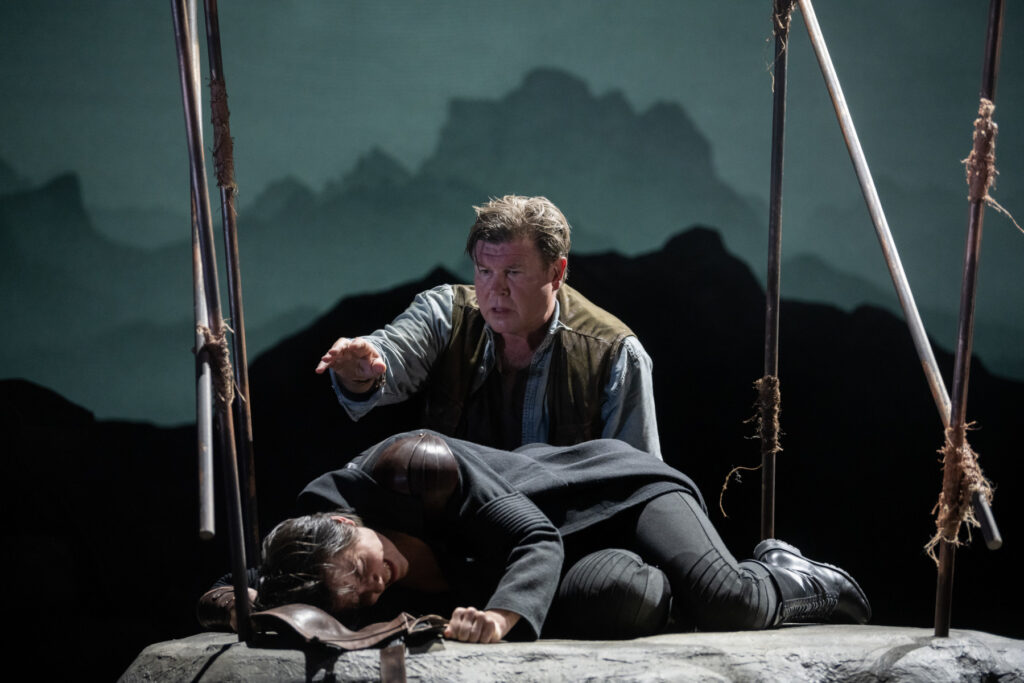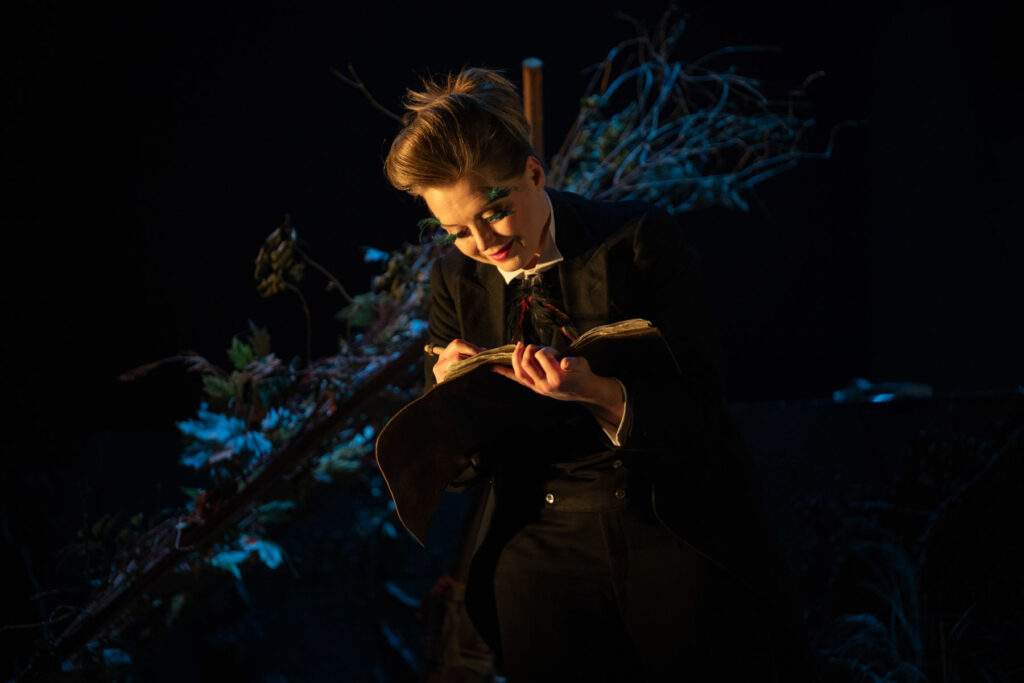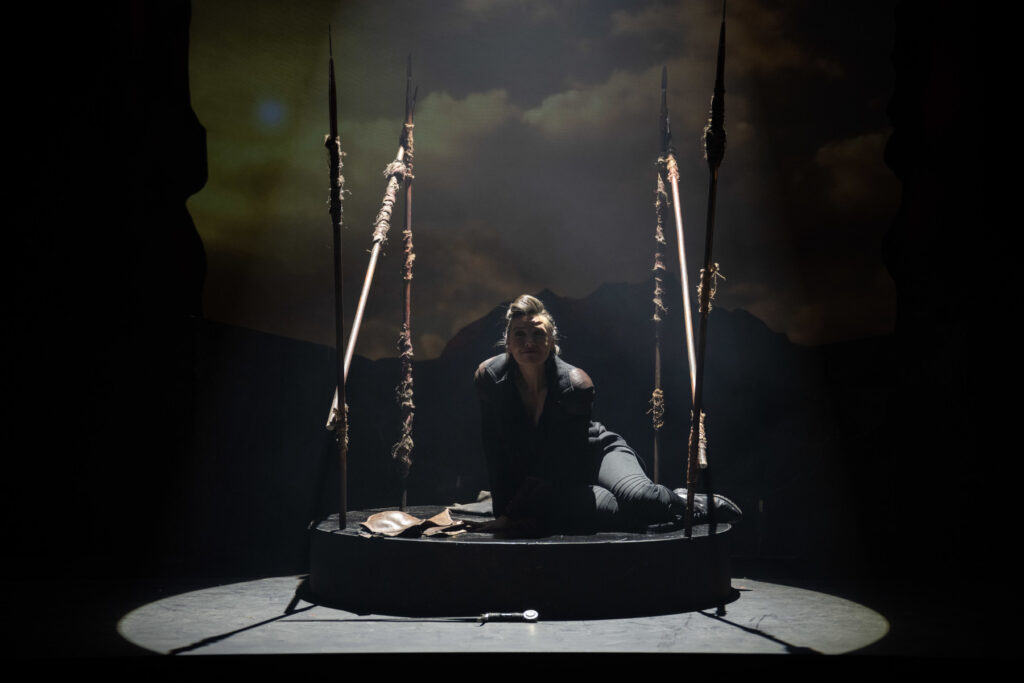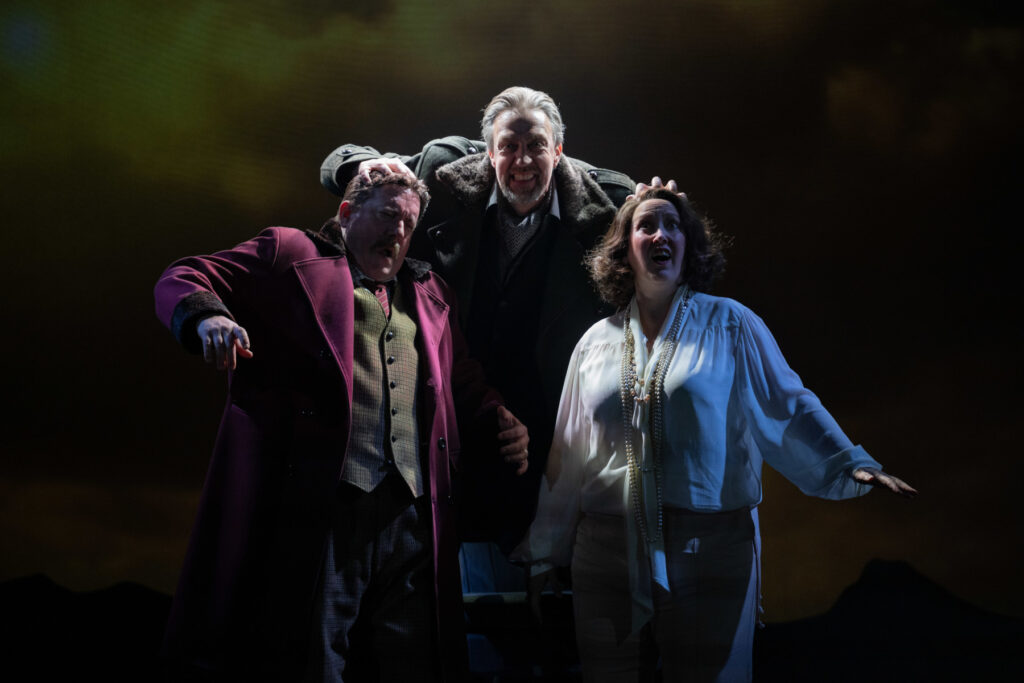Longborough’s last two segments of Der Ring des Nibelungen outline the rise and fall of Siegfried, the demise of the Gods and the eventual return of the Ring to the Rhine. Its dramatic curve, foreshadowed in Das Rheingold, brings the curse of the Ring to an inevitable conclusion, a thirst for power ultimately yielding to human love. Serious as that sounds, Amy Lane’s Siegfried (rebooted from 2022) underlined the work’s comic elements, most obviously in the first two acts. In many ways this reflects an observation by Rupert Christiansen (The Faber Pocket Guide to Opera) that Siegfried is “often regarded as comparable to the lighter scherzo which forms the third movement of many classical symphonies”. That’s as maybe, and this staging certainly enjoyed several witty moments, but those with Mime possibly misjudged.

First encountered as a benign presence in Das Rheingold, Mime’s sinister plotting in Siegfried is surely now driven by a more malevolent spirit. As much as I enjoyed Adrian Dwyer’s portrayal of the dwarf, his cavorting, puppet-like movements pointed to something more mischievous than menacing, a loveable rogue more than a personification of evil. When sporting a natty apron and toque there was little to indicate any sense of threat as he brewed a poisonous concoction of fruit and veg to kill Siegfried. However, Dwyer’s lyrical tenor, largely bypassing a deliberately grotesque manner often required for this role, was nicely shaped, the wide-ranging vocal part handled with ease.
It was difficult not to feel some sympathy towards Mime, whose care of the orphaned Siegfried is so brutally spurned. Australian tenor Bradley Daley presented this “monster of ingratitude” (Schopenhauer) as an overgrown schoolboy, an uncouth jack-the-lad more at home with the creatures of the forest than his supposedly foul foster parent. And in reprising this role, Daley was demonstrably more at ease in the riddle scene with Paul Carey Jones’s dignified but world-weary Wanderer (the self-exiled Wotan in disguise). He was also assured when engaging with Simon Wilding’s monstrous dragon Fafner, those crutches evoking a creepy four-legged beast, and later with Fflur Wyn’s delightful Woodbird whose fluttering eyelashes and nimble movement were enchanting. Her clean soprano tone was ideal too.

Elsewhere, Mark Stone’s vengeful Alberich was suitably dark in timbre, and Mae Heydorn’s richly sonorous earth Goddess sailed across her vocal registers with burnished tone. But it was with the arrival of Lee Bissett’s fabulously communicative Brünnhilde that the work’s drama went up several gears, her ardent tones (never mind the vibrato) soaring above the orchestra during her ‘Hymn to the Sun’, the ecstasy of her awakening by the enlightened Siegfried never more intense.

Throughout, Rhiannon Newman Brown’s sets were a triumph of economy, and provided all the necessary clues to conjure cave, woodland and rocky enclosure for Siegfried. Two giant rings illuminated the Hall of the Gibichungs in Götterdämmerung, while four spears brought a reminder of Brünnhilde’s solitary mountain retreat. Emma Ryott’s era-defying costumes caught the eye, but were we supposed to be terrified of the Vassals in their belted trench coats? As before, Tim Baxter’s video projections depicted an ever-changing sequence of natural and impressionistic images culminating in a raging inferno and Disneyesque blue skies to suggest the reunion between Brünnhilde, Siegfried and Wotan.
So well-paced and sung was Act 1 of Götterdämmerung you barely noticed its two hours duration. Lee Bisset continued to dazzle as Brünnhilde. But it wasn’t just her vocal fire power, or the meaning conveyed behind every facial expression that made her so credible, it was more the sustained emotional engagement whether delivering ardour, stoney-faced fury or torment. Her promise of fidelity to Bradley Daley’s fearless Siegfried was the real thing, its intensity overwhelming, and her immolation scene one of the most moving I’ve seen. We met Julian Close earlier in the week as Hunding (Die Walküre), and here he returned as the calculating and icy Hagen, his oak-aged tones adding much to a brooding portrayal enhanced by an unnerving stillness, his minimal movement generating maximum impact. Benedict Nelson, as Hagen’s half-brother Gunther was an effective foil, his traversal from chummy but morally bankrupt pal to remorseful idler well judged.

There were impressive performances too from Claire Barnett-Jones as an earnest Waltraute who ultimately fails to persuade Brünnhilde to return the coveted Ring to the Rhinemaidens. Laure Meloy was the naïve and grief-stricken Gutrune and Mark Stone a bedraggled Alberich. Each of the Norns and Rhinemaidens made distinctive contributions, so too the Vassals with their hearty choruses.
Crucial to the success of this production was Anthony Negus’s sure-footed direction of the 60 strong Longborough Festival Orchestra and, not least, some outstanding solo contributions with much to enjoy from off-stage horns and assorted woodwind. String tone was periodically lustrous and as impassioned as the voices above stage. Altogether, these were vividly detailed and involving performances, their emotional impact bringing a standing ovation at the close of Götterdämmerung. Once again, all concerned underlined Longborough’s unimpeachable Wagnerian credentials.
David Truslove
Der Ring des Nibelungen
Music & libretto Richard Wagner
Siegfried
Siegfried – Bradley Daley; Mime – Adrian Dwyer; The Wanderer – Paul Carey Jones; Alberich – Mark Stone; Fafner – Simon Wilding; Waldvogel – Fflur Wyn; Erda – Mae Heydorn; Brünnhilde – Lee Bisset
Götterdämmerung
Siegfried – Bradley Daley; Brünnhilde – Lee Bisset; Alberich – Mark Stone; Hagen – Julian Close; Gunther – Benedict Nelson; Gutrune – Laure Meloy; Waltraute – Claire Barnett-Jones; First Norn – Mae Heydorn; Second Norn – Harriet Williams; Third Norn – Katie Lowe; Rhinemaidens: Woglinde – Mari Wyn Williams; Wellgunde – Rebecca Afonwy-Jones; Flosshilde – Katie Stevenson; Chorus of Vassals & Longborough Community Chorus.
Director – Amy Lane; Sets – Rhiannon Newman Brown; Costumes – Emma Ryott; Video Designer – Tim Baxter; Longborough Festival Orchestra; Conductor – Antony Negus.
Longborough Festival, Moreton-in-Marsh, Gloucestershire. 28 & 30 June 2024
Top Image: Scene from Götterdämmerung – Mark Stone (Alberich) and Julian Close (Hagen).
All photos by Matthew Williams-Ellis.